Government shutdown: Get up to speed in 20 questions
updated 7:49 AM EDT, Tue October 1, 2013
STORY HIGHLIGHTS
- The new fiscal year has begun, but Congress couldn't agree on a spending deal in time
- House Republicans want a bill that include anti-Obamacare amendments
- Senate Democrats want a spending bill with no amendments attached
- More than 800,000 workers are expected to be furloughed starting Tuesday
Republicans and Democrats
couldn't agree on a spending plan for the fiscal year that started
Tuesday as they wrangled over Obamacare, leaving federal coffers short.
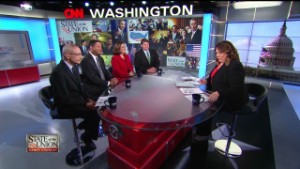 Political effect of a government shutdown
Political effect of a government shutdown
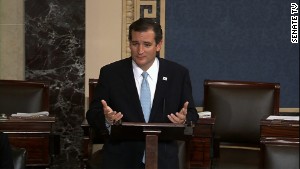 Media coverage of Obamacare, shutdown
Media coverage of Obamacare, shutdown
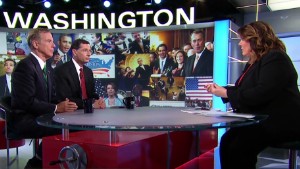 Obamacare: 'Duct tape and chicken wire'
Obamacare: 'Duct tape and chicken wire'
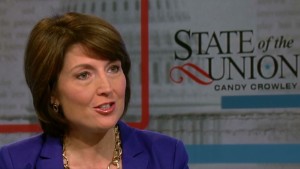 GOP Rep: Senate is 'playing games'
GOP Rep: Senate is 'playing games'
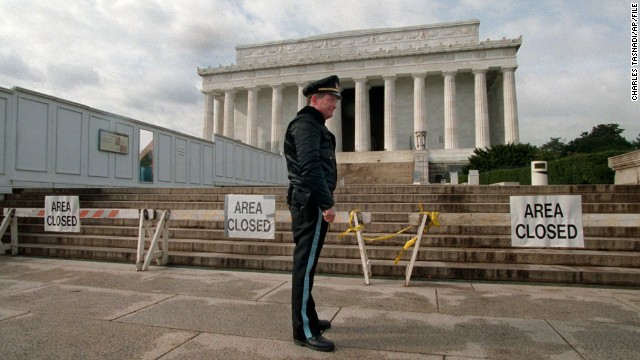 Photos: The last government shutdown
Photos: The last government shutdown
Here's a quick Q&A to get you caught up on what happened and what to expect:
1. Why did the government shut down?
Congress has one key duty
in the Constitution -- pass spending bills that fund the government. If
it doesn't, most functions of government -- from funding agencies to
paying out small business loans and processing passport requests --
grinds to a halt. But some services, like Social Security, air traffic
control and active military pay, will continue to be funded. Oh, and
Congress still gets paid, too.
2. Why does it have to pass a spending bill in the middle of the year?
It may be the middle of the calendar year, but the government's fiscal year runs from October 1 to September 30.
3. What was the holdup?
House Republicans insist
any new spending bill include provisions to either defund, derail or
otherwise chip away at Obamacare. Senate Democrats are just as insistent
that it doesn't.
4. How is Obamacare tied to the spending bill?
The health care law
isn't directly tied to funding the government, but it's being used as a
bargaining chip. A group of Republicans, led by freshman Sen. Ted Cruz
of Texas, believe the president's signature domestic policy achievement
is so bad for the country that it is worth disrupting government funding
to undercut it.
5. What are some of the objections to Obamacare?
The Patient Protection
and Affordable Care Act, the actual name of the law, requires all
Americans to have health insurance. Opponents say it'll hurt employers
and amounts to overreach by the federal government. Some have also
criticized the medical device tax that's part of the law, saying that by
imposing such a tax, it's basically sending jobs overseas.
6. What's the Democrats' defense?
They say the law will
expand access to health care and help rein in the rising costs of
coverage. Obamacare prevents those with pre-existing medical conditions
from being denied health insurance, and proponents say those who have
health insurance will no longer have to indirectly pay for those who
show up in emergency rooms uninsured.
7. What happened with the spending bill over the weekend?
The Republican-dominated
House passed two spending bill amendments Sunday morning -- one that
would delay Obamacare for a year and one that would repeal the
Obamacare's medical device tax. The bill went back to the Senate, where
Democrats who control that chamber have consistently said any changes to
Obamacare would be a deal-killer.
8. What happened Monday?
The Senate rejected the
latest House proposal, prompting the House to approve another spending
plan that would remove the Obamacare individual mandate. The Senate
rejected that, too, setting the stage for a shutdown.
9. What happened overnight?
House members voted to
reaffirm the anti-Obamacare amendments that Senate Democrats have said
would be a deal-breaker. They also requested a conference with the
Senate to work out their differences.
10. What will happen Tuesday?
The Senate will
reconvene and will likely make a decision on the House's offer to talk.
But Senate Majority Leader Harry Reid said late Monday night that he
wouldn't agree to such a meeting until the House presents a clean
spending bill stripped of the amendments.
"We will not go to conference with a gun to our head," he said.
11. Has this happened before?
Yes, this shutdown is the first since late 1995. That one lasted 21 days, into 1996.
12. How many government workers could be furloughed?
Most of the 3.3 million
government workers are deemed "essential" -- they'll keep working. But
more than 800,000 government employees will sit at home, according to a
CNN analysis.
Many of the furloughed
federal workers are supposed to be out of their offices within four
hours of the start of business Tuesday.
13. What will this do to the economy?
Depends on how long it lasts.
If it's just a few days, the hit might not be severe. But the total
economic impact is likely to be at least 10 times greater than the
simple calculation of lost wages of federal workers, said Brian Kessler,
economist with Moody's Analytics. His firm estimates that a three- to
four-week shutdown would cost the economy about $55 billion.
14. How will this affect me?
In ways big and small. The mail will continue to come. The military will continue to fight. And Social Security checks will continue to be paid.
But if you need a
federal loan to buy a house, you'll have to wait. If you want a gun
permit or a passport, that won't happen anytime soon.
15. Will a shutdown kill Obamacare?
No. Most of the money
for Obamacare comes from new taxes and fees, as well as from cost cuts
to other programs like Medicare and other types of funding that will
continue despite the government shutdown.
16. Will the president get paid during a shutdown?
Yes. His salary -- $400,000 -- is considered mandatory spending. It won't be affected.
17. What about House and Senate members?
They'll keep drawing checks, too. The 27th Amendment prevents any Congress from changing its own pay.
18. What does John Q. Public think of all this?
A CNN/ORC International poll that came out Monday
found that 46% will blame congressional Republicans if the government
closes its doors, with 36% saying the president would be more
responsible and 13% pointing fingers at both.
19. Isn't there another matter -- the debt ceiling?
Ah yes, that's the next battle brewing. Remember that time when you maxed out your credit card? That's what the debt limit is all about.
The U.S. is on the verge of maxing out its $16.699 trillion credit
card. And the president must ask Congress to raise the country's credit
limit.
But the debt ceiling debacle won't come to a head until October 17. Perhaps it's best to deal with one showdown at a time.
20. Can Congress agree on anything?
The House and Senate did agree on one thing. They finalized legislation Monday to keep paying troops in the event of a shutdown.
CNN's Leigh Ann Caldwell, Z. Byron Wolf,
Adam Aigner-Treworgy, Laura Koran, Lisa Desjardins, Bryan Monroe, Chris
Isidore and Gregory Wallace contributed to this report.
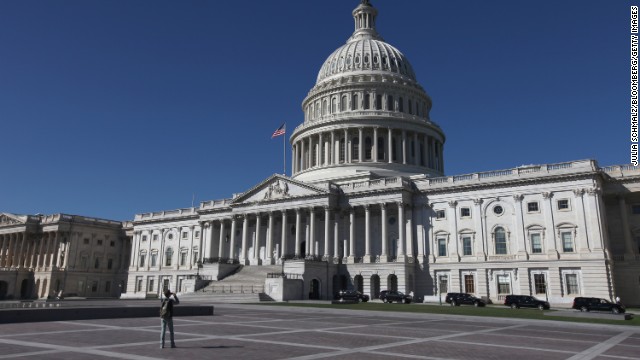 The game is the same, but many of
the players have changed. Congress and the president are facing off in
another supreme spending showdown. If they don't agree on a funding bill
by the end of September 30, much of government will shutdown. This last
happened in 2011, when Congress avoided a shutdown by passing a
spending measure shortly after the midnight deadline hit. Who controls
what happens this time? Take a look at the key players who will
determine how this fight ends:
The game is the same, but many of
the players have changed. Congress and the president are facing off in
another supreme spending showdown. If they don't agree on a funding bill
by the end of September 30, much of government will shutdown. This last
happened in 2011, when Congress avoided a shutdown by passing a
spending measure shortly after the midnight deadline hit. Who controls
what happens this time? Take a look at the key players who will
determine how this fight ends:
No comments:
Post a Comment
Please leave a comment-- or suggestions, particularly of topics and places you'd like to see covered